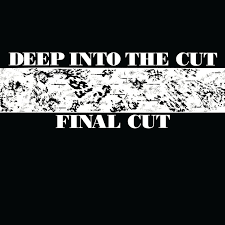The modern zeal for reissues, leaving aside the antics of the desperate dummies who clog up the pressing plants pre-Record Store Day with expensive glorified frisbees, is largely about unearthing buried treasure for a new audience. Occasionally, though, a so-called lost classic was really hiding in plain sight all along – like Deep Into The Cut, the 1989 debut album by Detroit techno-meets-industrial duo Final Cut. Used copies are already available to purchase, for a perfectly reasonable fee, at whichever online vendor you choose; this 2016 reissue on the We Can Elude Control labeljustifies its existence by putting all eleven tracks on vinyl for the first time and getting renowned Berlin soundtweaker Rashad Becker to remaster it.
Perhaps equally important, though, is the act of propelling this raucously entertaining record into a sort of public consciousness. Its crisp rhythms, angle-grinding loops of fury and bursts of euphoric melody foreshadow the 1990s output of one of the duo, Jeff Mills – without whom a huge swathe of techno music would sound very different. His partner in crime, Anthony Srock, didn’t exactly have the same impact on industrial rock when he steered Final Cut that way after Mills went solo, but as far as I can tell while sifting through his litany of bad tweets, still seems to be keeping the name alive in some form.
Of the duo it was Srock, in fact, whose talents were first to be preserved on wax: Asrock’s 1986 twelve-inch, ‘Order In The House’ an aggressively unrefined nugget of perfectly-of-its-time electro-rap. When Srock and Mills assembled as Final Cut, the initial result was another single, ‘The Bass Has Landed’ (all American dance music of the time had titles like these, it was the rules). Very much at the raw, machine-centric end of the house music explosion circa ’88, the strange, rattling percussion indicates this is Mills’ brainchild – as do the production credits on the record. Deep Into The Cut, which arrived the following year, further aligns itself with two more American scenes in bloom: techno, which had been given life in Detroit by some of Mills’ closest cohorts, and the kind of brash, rock-informed industrial peddled by Chicago’s Wax Trax! label.
Its full, hour-plus length is justifiable from an archivist’s perspective, less so from an editor’s; you’ll probably identify parts ripe for trimming, either full tracks or segments. ‘She Destroys’, which opens the album, is a vaguely camp EBM effort with a full set of lyrics, and an inauspicious start. ‘Temptation’ starts with half a minute of sampled dialogue crusading against pornography, which serves no good use save nullifying the flow (the beezer bounce of the track itself could have passed muster in, say, a millennial DJ Hell set). Even when Final Cut loop samples, like on ‘Open Your Eyes’, it feels a little bumptious and underdeveloped a quarter of a century later, although sampling was limited by technology at the time (cf the story behind ‘Voodoo Ray’).
Please, though, stay for the highs, which are numerous. ‘Rotation’ – a classically Millsian ‘functional’ title, that – is probably influenced by the leather-clad pummel of Nitzer Ebb, but spikes the mix with acidic drum madness and overspilling machine code. ‘I Told You Not To Stop’ and ‘Now That’s Funky’ have the kind of thunderous kickdrums and dramatic synth lines that weren’t quite yet a Detroit trademark, but would later get rinsed by Mills and others in the Underground Resistance crew. ‘Celestial VSU’ lands in curiously similar mutated-techno territory to the ‘bleep’ scene that was sprouting in northern England at the time, and is Deep Into The Cut‘s one moment that clearly favours empathy over punishment. Album closer ‘The Escape’ is unusually brief for a techno number at under three minutes, but its abrupt spinbacks and steel-jaw stutter rhythm could have done the biz on any of Mills’ early solo releases, say the Waveform Transmission Vol. 1 album.
If, over 25 years on, Deep Into The Cut fascinates largely because of its showcasing of one member’s embryonic brilliance, he wouldn’t command this much influence over Final Cut for much longer. A remake of ‘I Told You Not To Stop’, the swansong for the Mills/Srock partnership, is shlocky (albeit enjoyable) EBM with vocals by Ministry’s Chris Connelly. With a clear divergence in the duo’s ambitions – Mills wanted to push Detroit techno forward and seize it back from the major labels that had got their claws into Inner City; Srock wanted to make, in Mills’ words, “Satanic thrash rock” – they split for good. Final Cut carried on into the 90s with Srock plus various pals and sidemen; Jeff Mills became the greatest techno DJ in the world. It was around this time, though, and under this name, that he was tempted away from an interest in hip-hop production by the spectre of gnarly, ear-scrubbing, raveable electronic rackets. And we should be very thankful to Anthony Srock for his part in that.


